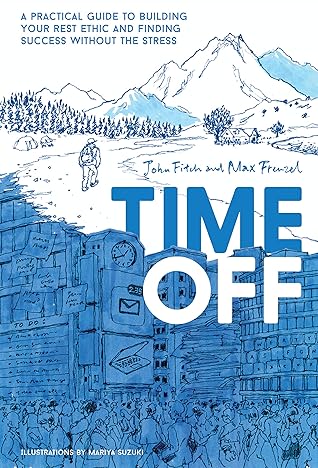More on this book
Community
Kindle Notes & Highlights
by
John Fitch
Read between
October 13 - November 5, 2020
short, you can’t create big things, lead amazing teams, solve great challenges, or make transformative art if you are sick (or worse, dead), if your brain is foggy, or if you are cranky and riddled with stress.
The higher the concentration of adenosine in our body, the more tired we feel
Even just a small amount of alcohol negatively impacts all the positive effects of sleep.
To easily initiate sleep, our core body temperature actually needs to drop by 1°C.
Exercise is the constant renovation of the idea factory between your ears, equipping you to handle more complex challenges and projects. Our brains – and as a consequence, our productivity and creativity – directly benefit from us being active.
Take your recovery seriously and save your full strength and best form for the days when it really counts.
The better we are at recovering, he notes, the greater our potential.
If you don’t go through the recovery phase, you will not reap the benefits of your training.”
A simple way to think about it is that once you get the “workout high” feeling, you are done.
For your next workout or work session, pay attention to your “perceived exertion” and don’t push yourself beyond the high.
“If you never realized what it’s like to take time off, it’s really difficult to appreciate its importance.”
Run hard to empty your mind, or jog slowly to think through a problem without distractions.
“The power of the wandering mind,” muses psychology professor Kalina Christoff, “is precisely the fact that it censors nothing. It can make connections you would never otherwise make.”
What are your most powerful triggers? Whether they are strong emotions or complete serenity, try to create more space for them through deliberate use of time off.
“subjective state in which your mind is free from input from other minds.”
“restorative niches,”
yourself what your ideal number X is and if you are actually getting that amount of solitude.
Being able to differentiate between what you truly want – and need – from what society wants for you.
“The alternative to solitude is loneliness.”
“argues that our ability to be happily alone is actually a sign of strong social ties, not a lack thereof.”
All too often in our relationships, romantic or otherwise, the new ways in which we communicate – frequent but shallow – leave us in some kind of grey zone that’s neither solitude nor true connection. We should relearn to prioritize true conversation over mere connection and embrace both ends of the spectrum fully.
In your industry or community, what are the assumptions and systems everyone believes in and relies on? Is it possible that some of them may be broken?
Is this working? Am I creating something of value? What am I missing? To answer these questions honestly, and to ensure that we are heading in the right direction, we have to make time to pause and reflect.
“Follow effective action with quiet reflection,”
‘If I can only achieve three things over the next three months, what should they be?’
“interstitial journaling.”
Write a few sentences in your journal about what you just did, and then a few more sentences about what you’re about to do.”
acquiescence: if something is outside of your control, there is no point worrying about it. Just accept it and move on. This is not giving up. It’s focusing on the things we can influence and not being distracted by useless anger or fear or trying to change the unchangeable.
The aim is control and domestication of emotion, not its absence.
“Choose not to be harmed – and you won’t feel harmed. Don’t feel harmed, and you haven’t been.” Choose not to be busy, and you won’t feel busy. Don’t feel busy, and you aren’t.
How much of the stress and the lack of time off you experience is actually genuine, and how much are you creating yourself by worrying about your lack of time off or being annoyed at people trying to get a piece of your time?
“Inner Citadel.”
he is quick to say no and slow to say yes.
Find the right projects by making a “More of / Less of” list
Apply the KonMari Method to your calendar to create time off
Not everything that is more difficult is necessarily more meritorious.”
what are your true motivators behind them? How about your relationships? Are you driven by actual love, or just drifting with the flow because of a lack of clarity?
As long as we attach a utilitarian goal to leisure, such as being refreshed for more work, we are missing out on its deepest benefits and joys.
What joys, small or big, are serving as beacons of motivation, creativity, and happiness in your life? Are you paying enough attention to them?
Tap into the love and passion that motivate you
Optimize your life for presence
Regularly exposing ourselves to new and unfamiliar ideas and trying to see the world from someone else’s perspective (maybe even someone we disagree with) are some of the best ways to temporarily flip into lantern mode.
Improvise a meal with your friends, family, or team
JOMO, the joy of missing out.
Time Off Microdosing – Document something simple that brings a smile to your face
Vagabonding: An Uncommon Guide to the Art of Long-Term World Travel,
Plan a sabbatical in three steps: #1 Commit. #2 Tell others. #3 Have a plan.
“anti-sabbaticals,” short
Try out a silent retreat or listen to a song without multitasking
One of the most powerful tools we have in our mental arsenal is selective attention.


